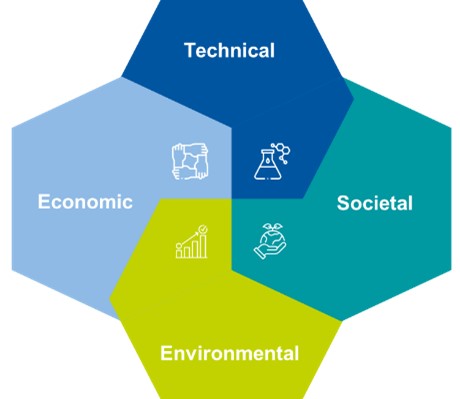Circularity in Electronics. From E-Waste to Resource – A holistic and interdisciplinary PhD program bringing sustainable and profitable e-waste processing for Indonesia’s future
From E-Waste to Resource – A holistic and interdisciplinary PhD program bringing sustainable and profitable e-waste processing for Indonesia’s future
Duration: 2024 – 2028
Funding: Indonesian embassy / Indonesian Ministry of Science
Project description:

The management of electronic waste (e-waste) has become a critical challenge in the modern world, both from an environmental and a resource management perspective. Globally, the electronics industry is growing exponentially, thereby exacerbating the accumulation of e-waste. This waste often contains hazardous materials that pose environmental risks, as well as valuable metals that are lost if not properly recovered. In Indonesia, the situation is particularly pressing due to rapidly increasing consumption and import of electronic products, combined with still developing e-waste management systems. While Indonesia is currently producing around 2 million tonnes of e-waste annually (e.g. smartphones, TV, computers), representing a value of 10 billion US$ for contained metals, it faces issues like unauthorized dumping, unregulated recycling operations, and low recovery rates of valuable materials. For gold alone, this inadequate processing causes a value loss of approx. 420 million US$. This highlights the need for a comprehensive solution tailored to the Indonesian context, and the circular economy offers a promising framework. The circular economy model promotes the efficient use of resources, encouraging the reuse and recycling of products and materials to minimize waste and environmental impact while retaining valuable raw material within the Indonesian economy.
Vision: Circular approach from the start
The vision of this program is to revolutionize the e-waste recycling landscape, combining circular solution like refurbishment or repair with sustainable recycling methods. Unlike Europe, where e-waste management structures are already well-established but may be rigid and resistant to change, Indonesia presents a unique opportunity. The country is not yet bound by too many legacy systems and infrastructures in this sector. This provides a chance to leapfrog traditional waste management systems and develop a circular ecosystem from the ground up. This is especially important in the regard of e-waste metals, which contain commodity metals like copper, lead, tin, iron, aluminium, and especially highly valuable rare metals like gold, indium, tantalum, and rare earth elements. Similar points can be made about e-waste plastics, which poses high risk for land and marine environments. Many rare metals are still lost in state-of-the-art recycling technologies, and this program aims to develop sustainable and efficient recycling alternatives. These alternatives, in combination with circular economy principles that extend product lifecycles, could position Indonesia at the forefront of sustainable e-waste recycling.
Structure of the Program
The program, comprising 15 complementary PhD topics, is designed as a multidisciplinary approach to tackle the multifaceted problem of e-waste. It encompasses the development of technical solutions, such as enhanced sorting technologies and innovative metal recycling techniques, that are complemented by social and environmental analyses. Topics like consumer behaviour and electronics recycling, ecosystem collaboration, and stakeholder engagement add layers of social understanding to technological advancements. Additionally, the program dives into circular business development, aiming to create viable business models that can not only sustain but also promote circularity in electronics. Courses and research areas span from environmental engineering to political science, all harmoniously integrated to provide a comprehensive understanding of how circular principles can be applied to e-waste management. The program's 15 topics offer a comprehensive and interdisciplinary approach to address the complex challenges of e-waste, from technological innovation to economic viability and social impact. These concepts aim to establish new standards for e-waste recycling and circularity, with Indonesia serving as a model.


